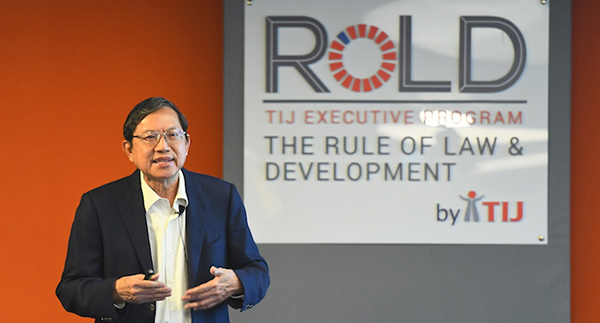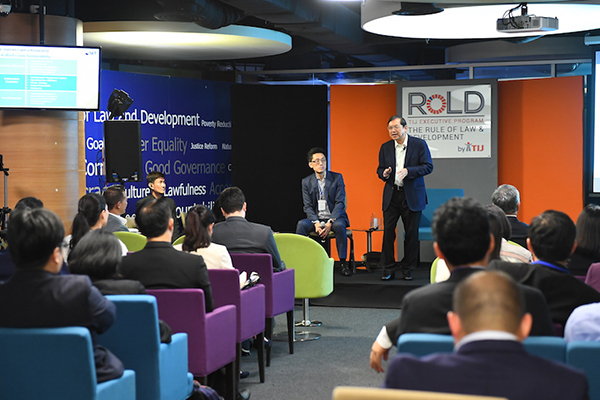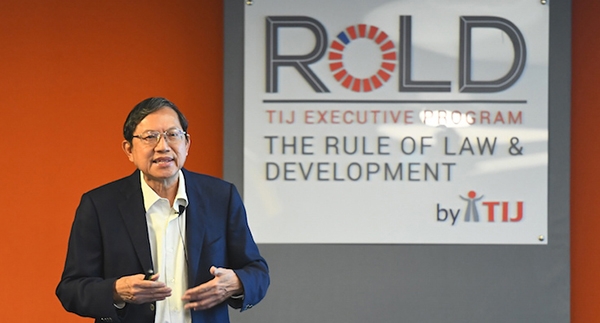There are many problems and challenges in Thai society today, namely, the quality of education and inequality in society. These problems make us realize that, in order to remedy these national problems, one cannot leave all the work only to the government or the public sector. Whether it is due to the complex nature of the problems or the way in which one goes about remedying the problems, these factors will have an impact on other relevant sectors, and may affect the rules of society in terms for example of resource distribution or equitable access to resources. Thus, lawyers and government officials are not the only parties concerned with finding solutions to these problems. In fact, participation in creating fair rules and regulations is a duty of every good citizen.
Recently, the Thailand Institute of Justice (TIJ) invited Dr. Chaiwat Wiboonsawat, Chairman of the Stock Exchange of Thailand (SET), to give a lecture and to exchange perspectives at the TIJ Executive Program on the Law and Development. The lecture focused on the roles of capital markets and involved stakeholders in the business sector in solving social and environmental problems, especially through social activities, in order to bring about a good, just, and equitable society.

Dr. Chaiwat began the session by addressing the important role of the SET in economic and social terms. He stated that capital markets are among the many tools for creating wealth and financial security for the society, owing to their ability to raise funds for entrepreneurs. They propel a circular economy and better infrastructure for the country. When a trader gains a profit, employees are also paid and their families gain more income, while the shareholders earn dividend income.
In order to effectively administer its role, the SET has been promoting equal access to capital markets for everyone. It seeks to provide entrepreneurs and small investors with greater access to capital markets, including the creation of a training platform for start-ups to strengthen their capabilities and to enable them to be listed on the stock exchange. Moreover, the SET also provides individual investors with an online channel to learn about investing and financial planning. This online channel focuses on four important points: knowing how to earn money, knowing how to save money, knowing how to spend money, and knowing how to invest, including campaigns to realize financial planning for retirees. This is one way to reduce the disparity and problems in society.
In addition, the SET supports listed companies, which are certainly ready and have the resources to help improve the society and to initiate social activities. The activities revolve around two concepts: corporate social responsibility (CSR) and sustainable development (SD).
The CSR concept can be divided into three categories: 1. CSR after Process, which are activities beyond normal work, such as social activities and donations; 2. CSR in Process is CSR in working processes that deal with social and environmental impacts, such as conducting business in a fair and equitable manner and taking responsibility for consumers and the environment into account; and 3. CSR as Process, which is a business specifically initiated for the good of the society or a so-called “social enterprise,” for example, the Enterprise Foundation.
SD places importance on businesses that meet the needs of today's society while at the same time create no harm for future generations. SD must take into account three main issues: the economy, the society, and the environment.

At present, there are around 1,000 community-based activities involving education for the youth, the disabled, and the elderly, organized by the listed companies.
Apart from the SET’s effort to promote responsible business practices in line with corporate social responsibility and sustainable development, presently there are other enforcing factors: laws or regulations to protect the people, recognition of the role of individuals and organizations regarding global sustainability, the protection of reputations, and finally, the factors relevant to the expectations of the stakeholders, all of which can encourage the private sector to further engage in the context of Thai society.

In this regard, stakeholders can play a part in determining the direction of business. These stakeholders could be from many sectors, for example groups of consumers that have the power to decide whether the listed entity is good or bad; partners and business partners in major companies that may have the authority to set standards for product requirements, such as restricting production processes so that they have no adverse impacts on the environment; shareholders and investors, such as institutional investors, who are obliged to choose to invest in companies with good governance; employees that would prefer to work with reputable companies; and the community and society, which will not stand for any companies that do wrong.
Dr. Chaiwat concluded that in conducting social activities, the most important thing is that the organization’s leader have faith and be cognizant of the importance of social impacts, because leaders can translate initiatives or ideas into action, whether in policies or administrative planning, which might result in improved work processes. Awareness and implementation of initiatives at the corporate level are paramount. This can extend the results to partners, business partners, and finally, the business sector as a whole. Commitment to the utilization of the business sector to promote quality of life and to reduce inequality is a vital force that leads to a peaceful and just society.
For more information, please visit: http://tijrold.org/



